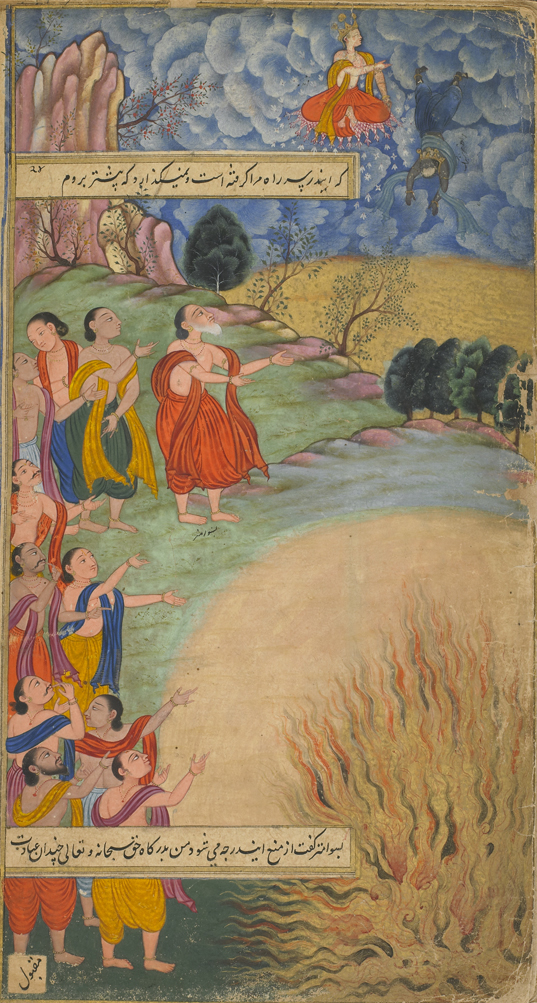 |
| Trishanku |
The Ramayana tells us that Satyavrata was the third ruler of Ayodhya, the city that will be the capital of Rama's kingdom. Satyavrata was very devoted and asked the court sage, Vasishta, to celebrate a sacrifice that would allow him to ascend to Indraloka, which is Indra's paradise, with his own mortal body.
Vasishta refused, saying him was not possible and the king then addressed the sons of the wise man. These were angry and cursed Vasishta forcing him to become a candala, an outcast, and forcing him to twelve years of exile.
During his exile there occurred a tremendous famine and Satyavrata, thanks to the skills acquired during the exile, fed the family of the sage Visvamitra, great opponent of Vasishta who had taken his place at the court of the king.
Here the traditions diverge, but I like to tell the story of how Satyavrata fed the hungry poor people with Kamadhenu, the sacred cow that emerged from samutramanthan, the churning of the ocean, the cow belonged to Vasishta.
For this reason Satyavrata is also known as Trishanku, or 'triple sinner', having committed three grave sins: stealing a cow, killing it, eating its meat.
Of course Visvamitra was very happy for the triple sin and he promised Satyavrata to celebrate the great sacrifice to allow him to climb into the paradise of Indra with the mortal body as he desired.
The sons of Vasishta tried to impede the sacrifice, but Visvamitra reduced them to ashes and threw them a terrible curse: they should have been reborn seven hundred times as an outcast.
In the end the sacrifice was regularly performed with the participation of rishis and sages from all over India and Satyavrata ascended with his own mortal body to heaven. But once he reached Indraoka, just Indra and the other gods opposed him as he entered: "A mortal body is not allowed to enter the paradise of Indra!"
While poor Satyavrata stood between heaven and earth, hanging upside down, a great diatribe arose between the gods and the sage Visvamitra who threatened the gods to create a new heaven, Trishanku's heaven, and new gods in place of existing ones starting with Indra.
Having said that, the sage, with the great powers he had acquired in years and years of austerity and meditation, created a new constellation and was about to create a new sky and, above all, new gods, when Indra proposed an agreement.
"The new constellation can remain and Satyavrata can remain among the new stars, but he does not enter paradise and you Visvamitra desist from your intentions."
Visvamitra understood that he could not pull over the rope and accepted.
So poor Satyavrata-Trishanku is there in heaven upside down and can neither return to earth nor access heaven.
For this reason, in certain parts of India even today, when a person is in a situation of uncertainty, they say "you are like Trishanku" e the situations of uncertainty are described as
"Trishanku's heaven".
Nessun commento:
Posta un commento